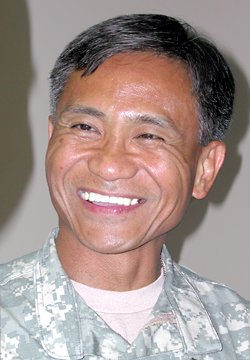Taguba Exclusive: Abu Ghraib Translator Lacked Training
By Leon Worden Friday, April 22, 2005
*MEDIA—MANDATORY CREDIT: The Signal newspaper of Santa Clarita, Calif.
Signal Multimedia Editor

MG Taguba, 4/20/2005 (Leon Worden / The Signal)
anyon Country resident John B. Israel was trying to do the right thing for his adopted homeland when he signed on as a translator for U.S. Army intelligence at Abu Ghraib prison in October 2003. But he received incomplete training when he got there, fell in with an interrogator who didn't adhere to strict Army policy, and gave inconsistent answers when questioned about the abuses he may have witnessed.
C
So says the Army general who singled out Israel 13 months ago as one of four people "either directly or indirectly responsible" for the abuse of prisoners at Abu Ghraib.
"He was there probably because he wanted to do the right thing. Probably his only failing was that he was not trained properly, and obviously he was influenced," said Maj. Gen. Antonio M. Taguba in an exclusive Signal interview Wednesday evening in Long Beach.
It was the first time Taguba, the two-star Army investigator who drafted the so-called "Taguba Report" on the prisoner abuse scandal, has discussed Israel's potential culpability.
Asked why he thought Israel lied to him when he said he neither witnessed nor heard any rumors about the abusive treatment that occurred while Israel was deployed at the prison, Taguba said, "Because of the statements that he made. Witness statements. It was conflicting."
Taguba said he identified Israel as a culprit "only because he was associated with Stefanowicz. Both of those two worked together."
Steven A. Stefanowicz was a contract interrogator suspected by Taguba of using harsh methods when questioning detainees. Israel's job was to translate questions and answers between Stefanowicz and inmates.
Asked whether Israel's subordinate role to Stefanowicz made Israel one of the "directly" or "indirectly" responsible parties, Taguba said, "I wasn't looking at it in that way. I looked at it just more from his association with — as a translator, and whether he should have revealed or reported what he saw."
At the time he gave his sworn testimony to Taguba on Feb. 12, 2004, Israel was working with Stefanowicz on what he called "a special project." Taguba subsequently took the prison commander, Col. Thomas M. Pappas, to task for allowing a translator who had no security clearance — Israel — to have access to "highly sensitive" intelligence information. Taguba relieved Pappas of command over the prison on the spot.
Sensing Taguba's displeasure when Israel told him his security clearance was pending, Israel asked if his testimony on the Abu Ghraib investigation would hurt his chances for getting it.
"You're not being suspected of anything," Taguba replied, without saying yes or no.
Israel, a naturalized U.S. citizen, told Taguba he enjoyed the opportunity to serve the country he adopted in 1981.
"If you guys need me in the future, I'd be glad to serve," he testified in February 2004. "And I'm happy to serve the United States Army. It's a pleasure for me because they opened the door. The United States gave me a home, so they made me feel at home. That wasn't my original home, and I'm dedicated to serve the United States in my full capacity."
"I'm glad you mentioned that, Mr. Israel," Taguba said, "because I'm a naturalized citizen myself, so I understand how you feel."
Born in the Philippines and raised in Hawaii, Taguba is the second-highest ranking Filipino-American in the military.
Israel told him he was looking forward to getting his security clearance.
"At least I'd know I have a job for the whole year," he said.
He was back home in Canyon Country the first week of April 2004.
In a May 2004 Signal interview, Israel's next-door neighbor vouchsafed for his integrity.
"He seems to be a very nice man. It seems so out of character that he would be accused of that," the neighbor said. "He usually doesn't speak until he's spoken to. I don't think he has it in him to hit a man."
She said Israel was "really bent on going back" to Iraq because he felt it was his duty to help.
On Wednesday, Taguba laid to rest any speculation that he had confused Israel — an Iraqi-born Christian, then 48, working under San Diego-based Titan Corp.'s Army linguist contract — with Adel Nakhla, another Titan translator who was also Christian, age 50 and born in Egypt. Nakhla appeared in some of the prisoner abuse photos and was immediately fired by Titan Corp.
Of the two, only Israel made Taguba's list of "responsible" parties (the others were Pappas, Stefanowicz and Lt. Col. Steve Jordan).
"Oh, no," Taguba said when asked if he'd confused Israel and Nakhla. "I remember Israel. ... Oh, yeah."
He added: "I didn't see him in any photographs, though."
©2005, THE SIGNAL · ALL RIGHTS RESERVED.